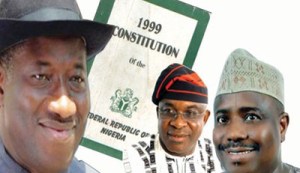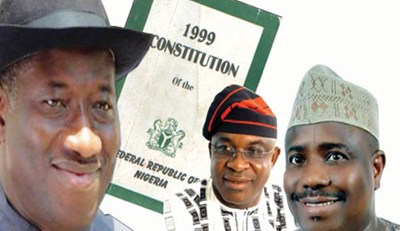 Financial autonomy for state legislators also ratified; independence for LGs fails Office of the Accountant General of the Federal Government to be created
Financial autonomy for state legislators also ratified; independence for LGs fails Office of the Accountant General of the Federal Government to be created
Omololu Ogunmade in Abuja
The face of the new constitution being awaited by Nigerians finally unfolded on Friday with the submission of the output of the state houses of assembly votes on amendments to the 1999 Constitution.
One of the major highlights of the approved amendment was the separation of the Office of the Minister of Justice from that of the Attorney General of the Federation.
For years, activists and human rights groups have agitated for this separation to insulate the office of the Attorney General from executive interference.
Also, in a major move that will see state assemblies freed from the control of governors, the state legislators approved financial autonomy for state houses of assemblies.
The Chairman, Conference of Speakers of State Houses of Assembly, Samuel Ikon, while submitting the report, disclosed that state legislatures succeeded in securing more than the required two-thirds to seal the amendment for the separation of the Office of the Minister of Justice from that of the Attorney General of the Federation.
The amendments were transmitted to the states by the National Assembly on October 28.
Ikon also said the state legislators secured the required two-thirds for the approval of financial autonomy for the houses of assemblies as well as the creation of the Office of the Accountant General of the Federal Government.
However, there are suspicions that the proposal for local government autonomy recommended by the National Assembly might have been rejected by state lawmakers as Ikon did not mention it during his presentation.
According to Ikon, the outcome of the houses of assembly voting on the amendments will strengthen democracy as he argued that amendment to the constitution was a continuous process.
While commending the National Assembly on the amendment process, the speaker said the outcome of the voting would give Nigerians the assurance of a promising future adding that having played their own part, it was left for posterity to judge them fairly.
In his remark, Senate President David Mark who received the document from Ikon recalled how he told the speaker on October 28 that the National Assembly had no hidden agenda regarding the amendment.
According to him, what they transmitted to the states were the wishes of Nigerians which he said they gathered during public hearings conducted across the zones of the federation.
Mark, who expressed delight in Ikon’s disclosure that the state legislatures had passed the autonomy for houses of assemblies, added that if they failed to approve autonomy for the local government, the National Assembly would still sustain the amendment process until common sense prevails.
While remarking that no further amendments would be carried out by the seventh National Assembly, Mark commended the states for promptly concluding decisions on the amendments, promising that the National Assembly would also promptly collate the votes by each house with a view to determining which of the amendments scaled through or not.
He also noted that constitution amendment would be a futile efforts if operators of the constitution fail to adhere to its provisions as he noted that provisions of the constitution must be binding on all and sundry.
Also speaking, Chairman of the Senate Committee on the Review of the Constitution, Ike Ekweremadu, said the drive to amend the constitution was borne out of the desire to meet the yearnings and aspirations of Nigerians.
According to him, when the people are not carried along in the process of producing a constitution, they will not be obliged to support it adding that the durability of a constitution depends on the degree of public support for it.
Ekweremadu, who is also the Deputy Senate President, added that the current constitution amendment would go a long way in enhancing institutional and legal reforms.
He said: “The bill you have transmitted to us today is a culmination of the will of the people of Nigeria. The legislature has long recognised that to secure the future of Nigeria, it must produce a Constitution that would meet the aspirations and needs of Nigerians and that which will facilitate national development in an equitable manner. Durability of constitutions depends on public support as citizens and the public are less inclined to support a constitution without their input. There is no doubt that broad citizens’ participation, which was the mainstay of the review process has added value to the democratic process and improved the quality of governance.
“It can be gleaned from the resolutions you have transmitted to the National Assembly today that the amendments set out institutional and legal reforms, which together with sufficient political will, may help to provide for constitutional and other legal guarantees for the practice of true federalism; provide for accountability and transparency in governance; and, create an independent judicial system that would ensure the proper administration of justice in Nigeria.”
In his own speech, Chairman of the House Committee on Review of the Constitution, Hon. Emeka Ihedioha, expressed hopes that the resolutions of the houses of assemblies would meet the aspiration of Nigerians.
Ihedioha, who is also the Deputy Speaker of the House of Representatives, assured that the National Assembly would abide by the outcome of the states’ voting.
“We shall carry out this final exercise with dispatch particularly given the limited time in the life of the current assembly. We hope that the resolution reached on the bill by the houses of assemblies of the states would meet the expectations of Nigerians on the key issues that were affected by the exercise.
“We are justifiably proud of the work done by the National Assembly contained in the proposals sent to the state houses of assemblies for their approval or rejection as the case may be. Whatever the outcome of the returns from states, we will accept it as the inevitable consequences of running a federation where the input of the states is a critical requirement. Indeed, the process of amending or altering the constitution is a continuous one. It does not end with this one,” Ihedioha noted.







